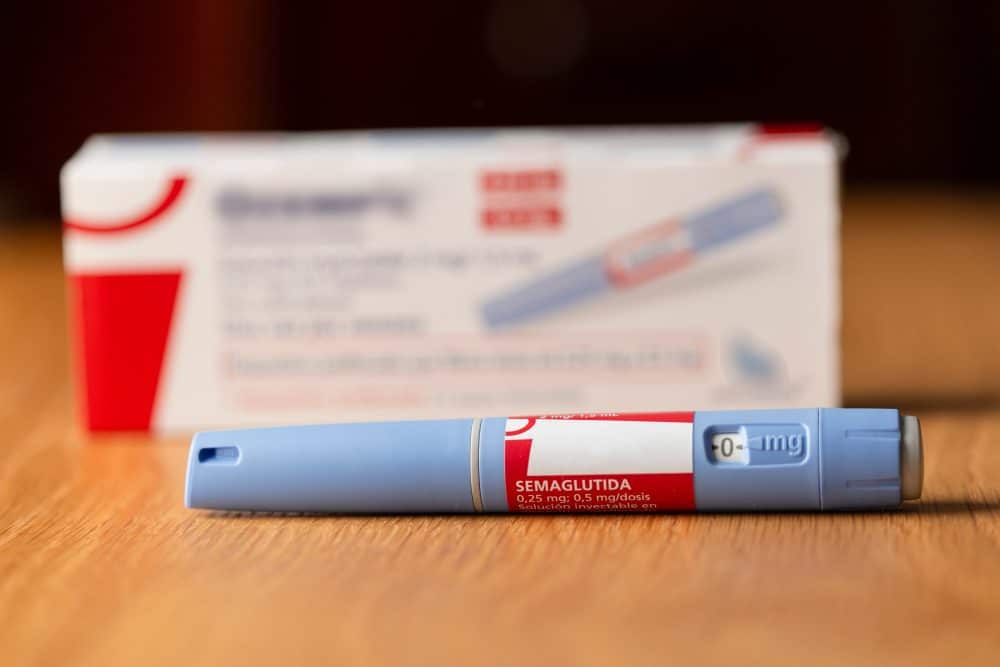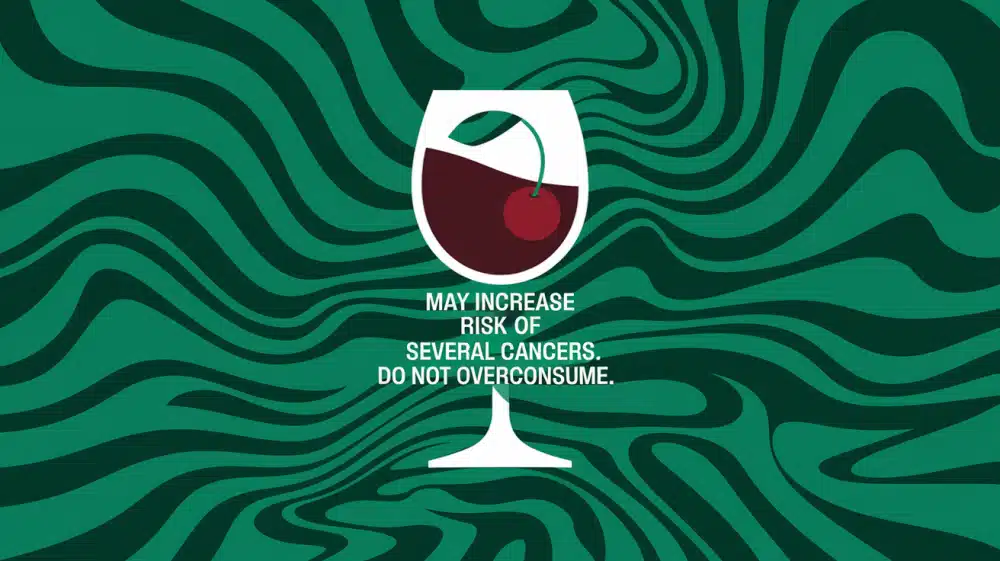National Drug and Alcohol Facts Week (NADFW) is a collaborative effort hosted by the National Institute on Drug Abuse (NIDA) and the National Institute on Alcohol Abuse and Alcoholism (NIAAA) to raise awareness about drug and alcohol use among teens. 2021 marks the 11th annual event, to be held March 22 to 28.
It is especially important to raise awareness about drugs and alcohol given the fact that teen drinking is especially prevalent in the United States, closely followed by marijuana, then tobacco.
Drug and alcohol use among teens can have significant consequences, impacting on their studies, health, as well as posing a danger when driving under the influence of substances. We’ve highlighted information about National Drug and Alcohol Facts Week, details how to get involved, and key research showing the prevalence of drug and alcohol use among teens.
Background to NDAFW
Quite often drug and alcohol use is glamorized on TV, movies, social media and the internet. Launched in 2010 by scientists at NIDA, National Drug and Alcohol Facts Week aims to link students with scientists and other experts to educate and to counteract myths about drug use. Their goal was to educate teens about the impact of drug use and addiction. In 2016, the NIAAA became a partner and together NIDA and NIAAA educate teens on the impacts of drugs and alcohol.
There are a number of federal partners for National Drug and Alcohol Facts week, who are working to educate teens in communities nationwide. They include the Substance Abuse and Mental Health Services Administration, the White House Office of National Drug Control Policy, the Office of Safe and Healthy Students in the US Department of Education, and the Drug Enforcement Administration in the US Department of Justice.
Drug and Alcohol Chat Day
Each year during NDAFW there is an online chat held between students and NIDA scientists. It provides information and an opportunity for students to ask any questions they may have about drugs and alcohol use, including their effects, concerns they may have about friends and family misusing drugs, and even information about what causes addiction.
Why Celebrate NDAFW?
Many teens are unaware of the health risks associated with drug use, the risks to their academic pursuits, and even risks to driving. The intention is that with education, teens are better prepared to make healthier choices for themselves and their friends.
Facts About Teen Drinking & Drug Use
As we’ve alluded to, drinking and drug use can have a significant impact on health, academic performance, safety, and even cause injuries. A national survey on drug use and health, conducted by the Substance Abuse and Mental Health Services Administration (SAMHSA), revealed:
- Almost 60 percent of college students aged 18 to 22 drank alcohol in the past month, compared to 48 percent of young adults the same age who are not in college
- Almost 66 percent of them had engaged in binge drinking during that month, compared to 32 percent of young adults the same age
- 5 percent of college students aged 18 to 22 reported heavy alcohol use in the past month, compared with 8.5 percent of persons the same age
- 20 percent of students — over 300,000 young adults — meet the criteria for alcohol use disorder
- Among 12th graders, close to 2 in 10 reported using prescription medication without a prescription
- Around half of 9th through 12th grade students have used marijuana
According to the National Council of Alcoholism and Drug Dependence, the potential consequences of binge drinking include academic problems, driving under the influence, assault, sexual abuse, injury, property damage, unsafe sex, health problems, suicide attempts, involvement with the police, and death.
A study was conducted to determine the magnitude and trends of alcohol-related consequences stemming from harmful and underage drinking. It revealed that each year among college students between the ages of 18 to 24:
- 1,825 died from unintentional alcohol-related injuries, including car accidents
- Almost 10 percent of students drove under the influence of alcohol
- 696,000 (12%) were struck or assaulted by another drinking college student
- 97,000 (2%) were victims of alcohol-related sexual assault or date rape
- 1 in 4 students reported that drinking affected their studies, including missing classes, falling behind performing poorly in tests, and receiving lower grades
- Students who binge drank three times a week or more were around six times more likely to perform poorly on a test and five times more likely to have missed a class
How Can I Get Involved in NDAFW?
The National Institute of Drug Abuse offers online toolkits and information about how to plan events and find experts to participate. You can find out information about how to plan your event, register for free materials including the National Drug & Alcohol IQ Challenge quiz, and other helpful materials.
You can visit the National Drug & Alcohol Facts Week website for more information.
Gallus debunked several myths surrounding NDAFW:
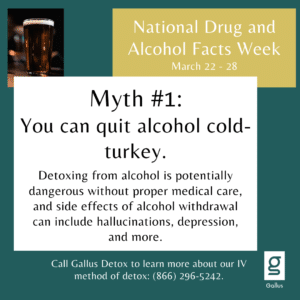
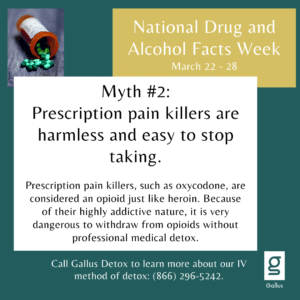
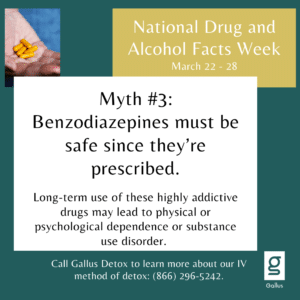
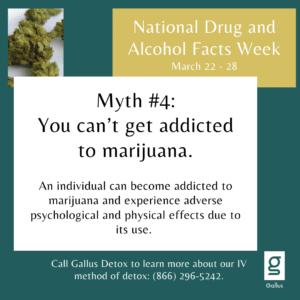
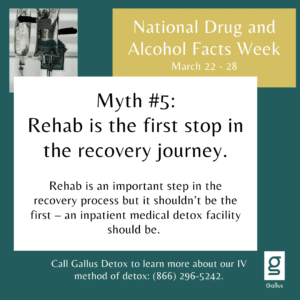
More resources
You may find our articles about Alcohol and the Developing Brain and College Drinking Fact Sheet helpful. Additionally, the National Institute of Health has produced an interactive guide called CollegeAIM (Alcohol Intervention Matrix) a resource designed to help schools and colleges address underage student drinking. It lists many alcohol interventions, counseling options, and policies. Get more information here.
At Gallus Medical Detox Centers, we bring compassion to the commotion. Peace to the pain. Empowerment to the powerless. If you or someone you know needs support with addiction problems, bring us your battle. Call us today and take the best, first step towards recovery: 720-704-1432
For information about finding a detox center, visit our alcohol addiction treatment page.


 Steve B
Steve B 